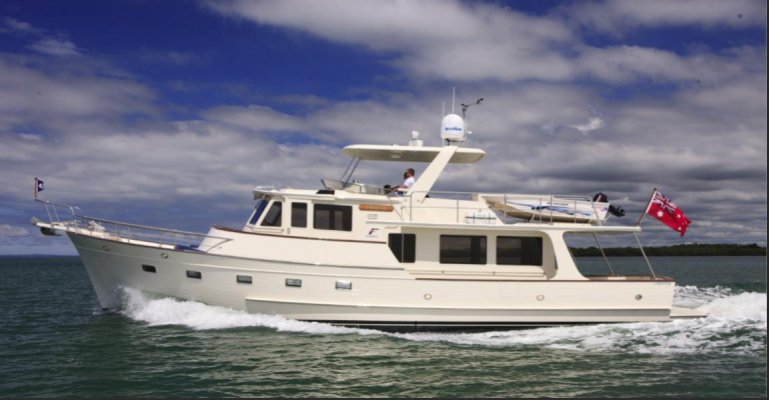Hi All:
I'm new to this forum, so I apologize if I'm starting a conversation that has already been worn out. If I am, please just tell me where to look for the old thread.
In the next 3-5 years the admiral and I will be moving onboard a boat for at least three months each Winter. We are 99% interested in staying in the Caribbean for this time. We charter in the BVI's each year, but are looking at starting in the Bahamas/Exumas for our first Winter.
In looking to upgrade from my current 2002 Bayliner 3988 to a larger vessel, I'm torn between deep, heavy boats like a Nordhavn, Krogen, etc. and something that has the ability to get up and go to outrun weather, cross the Gulf Stream quickly, etc. Our budget is $750k or less.
I'm from Alaska and grew up in the commercial fishery, so I lean toward the big, heavy, slow girls that cruise at 8-9 knots like the fishing boats I spent most summers onboard. I owned a CHB 34' for a decade in Alaska and loved the high freeboard, simple mechanical systems and the Lehman 120. However, having boated in SW Florida for the last six years, I've come to appreciate the "safety" features of being able to outrun a thunderstorm at 25 knots and getting into shallow anchorages that deeper drafts would preclude.
I'd be very interested in hearing from others who have actually spent significant time in the Caribbean. Would you rather have a boat that can get up on step and cruise at 18-22 knots when needed, and draws less than 4'? Or would you prefer deep, heavy, stabilized boat that moves waves rather than gets moved by them?
I do realize I'm essentially asking the question: "Which is better, Catholic or Protestant?" or "Which is better, Democrat or Republican?" So please feel free to let you personal bias run free.
Thanks in advance for sharing your experience and insight.
Dave Stephens
I'm new to this forum, so I apologize if I'm starting a conversation that has already been worn out. If I am, please just tell me where to look for the old thread.
In the next 3-5 years the admiral and I will be moving onboard a boat for at least three months each Winter. We are 99% interested in staying in the Caribbean for this time. We charter in the BVI's each year, but are looking at starting in the Bahamas/Exumas for our first Winter.
In looking to upgrade from my current 2002 Bayliner 3988 to a larger vessel, I'm torn between deep, heavy boats like a Nordhavn, Krogen, etc. and something that has the ability to get up and go to outrun weather, cross the Gulf Stream quickly, etc. Our budget is $750k or less.
I'm from Alaska and grew up in the commercial fishery, so I lean toward the big, heavy, slow girls that cruise at 8-9 knots like the fishing boats I spent most summers onboard. I owned a CHB 34' for a decade in Alaska and loved the high freeboard, simple mechanical systems and the Lehman 120. However, having boated in SW Florida for the last six years, I've come to appreciate the "safety" features of being able to outrun a thunderstorm at 25 knots and getting into shallow anchorages that deeper drafts would preclude.
I'd be very interested in hearing from others who have actually spent significant time in the Caribbean. Would you rather have a boat that can get up on step and cruise at 18-22 knots when needed, and draws less than 4'? Or would you prefer deep, heavy, stabilized boat that moves waves rather than gets moved by them?
I do realize I'm essentially asking the question: "Which is better, Catholic or Protestant?" or "Which is better, Democrat or Republican?" So please feel free to let you personal bias run free.
Thanks in advance for sharing your experience and insight.
Dave Stephens



 Given your desired data, an older one of these would serve you well!
Given your desired data, an older one of these would serve you well!